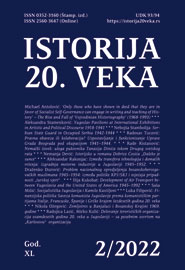DELOVANJE TERORISTIČKIH ORGANIZACIJA OSAMDESETIH GODINA 20. VEKA U JUGOSLAVIJI – SA POSEBNIM OSVRTOM NA „KARLOSOVU“ ORGANIZACIJU
ACTIVITIES OF TERRORIST ORGANIZATIONS IN THE 1980s IN YUGOSLAVIA – WITH A SPECIAL REVIEW OF THE “CARLOS” ORGANIZATION
Author(s): Radojica S. Lazić, Mirko KulićSubject(s): Security and defense, Post-War period (1950 - 1989)
Published by: Institut za savremenu istoriju, Beograd
Keywords: International Terrorism; Security Services; The Non-Aligned Movement; Yugoslavia; “Carlos” Organization
Summary/Abstract: The foreign policy orientation of the Former Social Federative Republic of Yugoslavia relied mostly on “third world” countries or the so-called Non-Aligned Movement. In line with the politically proclaimed principles, the cooperation was based on “active peaceful coexistence”, equality, independence, and staying out of inner problems of other countries, as well as mutual respect and solidarity. To strengthen and improve the safety interests and the leadership position within the Non-Aligned Movement, Yugoslavia wholeheartedly supported a variety of liberation movements. As a transit country with an extremely liberal visa regime, it was exposed to potential dangers to be a hideout for certain criminal, terrorist, and other groups. This was more than enough of a reason for trying to establish a “background base” of the “Carlos” terrorist organization in Belgrade. The security issue in the country was more complicated by the fact that in that period, there were around 12,500 different people from various Arab countries (not counting over 2,000 officers and non-commissioned officers trained in military schools) who were mostly students. Those persons belonged to numerous groups and organizations, all with their own conceptual, political and religious beliefs. They acted under different international influences. The security organizations and services had an obligation to carefully track their behavior and take certain measurements against individuals, groups, and organizations, to prevent their secret and illicit activities aimed against the interests of the state. In this sense, it is perfectly understandable that when the activities of the “Carlos” terrorist group were discovered, the problem had to be solved in order not to harm the international position and the credibility of Yugoslavia. The most powerful countries in the West (primarily the USA) have openly resented the benevolent attitude of the Yugoslavia authorities towards members of certain groups and organizations that have used terrorist methods in their acts. One of those cases was Abu el Abas, the senior executive of a fraction of the Palestine Liberation Organization. After unexplained circumstances after a hostage crisis in the Middle East, el Abas found himself in Belgrade.
Journal: Istorija 20. veka
- Issue Year: 2022
- Issue No: 2
- Page Range: 513-528
- Page Count: 16
- Language: Serbian

